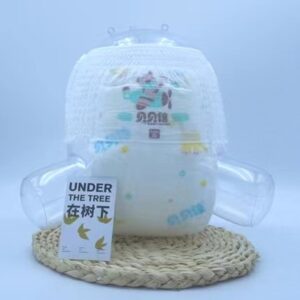Disposing of used disposable diapers in an environmentally friendly way involves some considerations to minimize their impact on the environment:
- Consider Composting: Some eco-conscious parents choose to compost biodegradable diapers. However, this process requires specific conditions and facilities that may not be available in all areas.
- Check Local Regulations: Check if your locality has diaper recycling programs or guidelines for disposing of diapers. Some regions have specific instructions for separating waste or recycling certain components of diapers.
- Remove Waste Properly: Dispose of solid waste from the diaper in the toilet before discarding the diaper. This practice reduces the amount of waste that goes to landfills and helps prevent contamination.
- Use Biodegradable Diapers: Opt for biodegradable or eco-friendly diapers if available in your area. These diapers are designed to break down more easily compared to traditional disposable diapers.
- Wrap Diapers Securely: When disposing of used diapers, wrap them securely in biodegradable or compostable bags before placing them in the trash. This helps contain any odor and minimizes contact with other waste.
- Reduce Overall Usage: Consider reducing diaper usage by using cloth diapers or practicing elimination communication (EC) to minimize the environmental impact of disposable diapers.
- Advocate for Sustainable Options: Support and advocate for eco-friendly diaper brands or initiatives that focus on reducing the environmental impact of diaper disposal.
- Explore Local Options: Some areas offer diaper collection services or specialized disposal methods for diapers. Research local waste management programs or facilities that handle diaper disposal in an environmentally conscious way.
- Avoid Flushing Diapers: Never flush disposable diapers down the toilet. baby diapers price They can clog plumbing systems and cause environmental damage to sewage systems.
- Educate Others: Spread awareness about environmentally friendly diaper disposal practices to encourage others to adopt more eco-conscious methods.
While disposable diapers present challenges for eco-friendly disposal, exploring alternative diaper options and researching local disposal guidelines can help minimize their environmental impact.
What advice would you offer to parents struggling with diaper rash issues?
Dealing with diaper rash can be challenging, but here are some tips to help parents manage and prevent it:
- Keep the Diaper Area Clean and Dry: Change diapers frequently, ensuring the baby’s skin remains clean and dry. Gently cleanse the area with mild, fragrance-free wipes or warm water during each change.
- Allow Diaper-Free Time: Give your baby some diaper-free time to air out the skin and promote healing. Lay them on a towel or waterproof mat to prevent messes.
- Use Diaper Rash Cream or Ointment: Apply a thin layer of diaper rash cream containing zinc oxide or petroleum jelly to soothe and protect the skin. Look for products without fragrances or harsh chemicals.
- Check Diaper Fit: Ensure the diaper isn’t too tight, as this can contribute to chafing and irritation. A well-fitted diaper allows airflow and reduces friction.
- Avoid Harsh Products: Avoid wipes or products containing alcohol, fragrances, or other harsh chemicals, as these can further irritate sensitive skin.
- Consider Cloth Diapers: Cloth diapers with natural fibers may reduce the risk of diaper rash compared to some disposable ones. Ensure proper cleaning and hygiene practices with cloth diapers.
- Change Diaper Brands: If the rash persists, consider switching diaper brands or types, as some babies might react differently to certain materials or absorbents.
- Pat Dry, Don’t Rub: After cleaning, pat the diaper area dry instead of rubbing to minimize friction and irritation.
- Limit Certain Foods: For babies on solid foods, certain foods might trigger diaper rash. Pay attention to potential culprits and adjust their diet if necessary.
- Consult a Pediatrician: If the rash persists or worsens despite home care measures, seek advice from a pediatrician. They can provide recommendations or prescribe medicated creams if needed.
Remember, prevention is key. Keeping the diaper area clean, dry, and free from irritants can help prevent diaper rash. If the rash persists or becomes severe, seeking professional medical advice is crucial to address the underlying causes and ensure your baby’s comfort and well-being.
